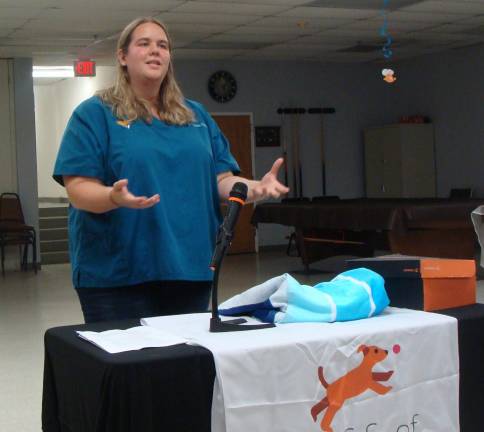First Aid for pets informs owners
Vernon. Dr. Stephanie Chlebowski of Vernon Veterinary Clinic informs D.O.G.S. of Vernon members about necessary pet first aid.

D.O.G.S. of Vernon held its third edition of pet education for pet owners conducted by Dr. Stephanie Chlebowski of Vernon Veterinary Clinic on Thursday evening Aug. 1.
The doctor began the seminar by discussing triage situations that would determine whether an injured of sick animal can be treated at home or is a true emergency requiring professional, medical help.
Dr. Stephanie explored several useful points when assessing animals in distress. Respiratory rates in pets should be 10 to 40 breaths per minute. Normal range for dog pulse rate is 80 to 160 beats. According to the vet, cats tend to have higher, normal rates of 100 to 220 beats. She also described the correct method of taking a pet’s pulse and respiratory rates.
“Cats should never pant like dogs do,” Dr. Stephanie explained. “Panting cats are either on their way to heat exhaustion or are overly stressed.”
The vet spoke in detail on pet CPR, reminding that compressions, early and continuous, are the most important.
“One hundred compressions while singing the song Staying Alive,” the doctor smiled as she demonstrated on a rolled towel.
Another hot topic of pet care is heat stroke, relevant with the season.
“Smushed-nosed and long-haired dog breeds are most at risk," she said.“Heat stroke is detrimental because it can cause gastro- intestinal disease."
The evening seminar ended with the doctor refreshing the group’s memory as to what constitutes an immediate emergency vet visit.